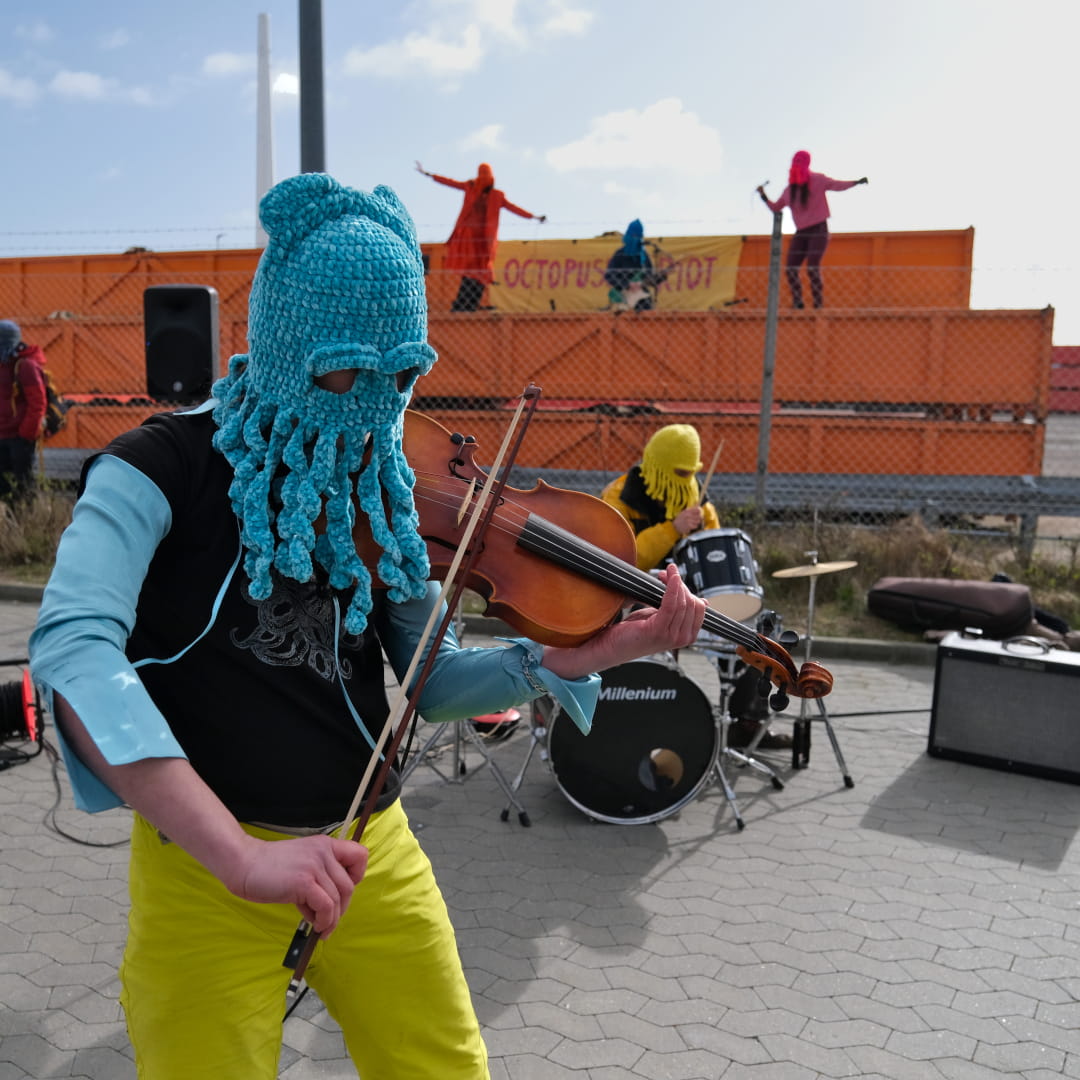
Octopussy Riot perform in the Total Energies section of an oil harbour in Denmark, part of the North Sea Fossil Free wave of actions across six countries.
This issue: North Sea Fossil Free | Melbourne Rebellion | XR Ecuador |
Dear rebel,
Back in October of last year, around 400 activists including rebels blockaded a luxury hotel in central London that was hosting the ‘Oscars of Oil’ - a three-day summit for Big Oil executives to schmooze with politicians and dish out awards.
The activists didn’t just come from different groups, they came from all across Europe, and a few of them sleeping overnight in the same church got talking. The protests by Fossil Free London had brought them together in the same city, but what if they coordinated a protest once they were all back in their different homelands?
Just five months later, their idea was a reality, manifested as the North Sea Fossil Free campaign, with North Sea oil infrastructure being disrupted in six countries simultaneously. You can read all about the blockades, the boat mission, and the punk concert in Action Highlights.

A Dutch Mer-rebel blockades Europe’s biggest oil refinery during the ‘North Sea Fossil Free’ campaign.
There you can also read about how rebels in Melbourne, Australia brought their city to a slow-marching standstill, and exposed a shadowy network of oil-sponsored organisations that are demonising ecoactivists around the world.
And finally you can find out why XR Ecuador are back out on the streets of Quito, and braving tear gas and police violence to demand that their corrupt government follow its own laws.
When you attend a protest, it’s not just about the cause you believe in and the actions you are taking. It’s also about the people you meet and the kindred spirits you connect with. You never know where those connections might take you. For the new rebel network behind North Sea Fossil Free, this is only the beginning.
This newsletter is available in multiple languages. Use the globe icon (top right) to change language.
This newsletter is brought to you by XR Global Support, a worldwide network of rebels who help our movement grow. We need money for this crucial work.
Contents
- Action Highlights: North Sea Fossil Free, Melbourne Rebellion, XR Ecuador
- Action Round Up: DRC, Kenya, Zambia, Finland, India, South Africa, Spain, USA, Argentina, France, Austria, UK, Belgium
- Book of the Month: How Civil Wars Start: And How To Stop Them
- Must Reads: North Sea Oil Analysis, Economists’ Ignorance, Why Did CO2 Fall in 17th Century?, Does Civil Disobedience Work?
- Announcements: XR Global Support Fundraiser, Everything Is Fine film
Action Highlights
The Sea Knows No Borders
16 MARCH | Denmark, Germany, Netherlands, Norway, Scotland, Sweden
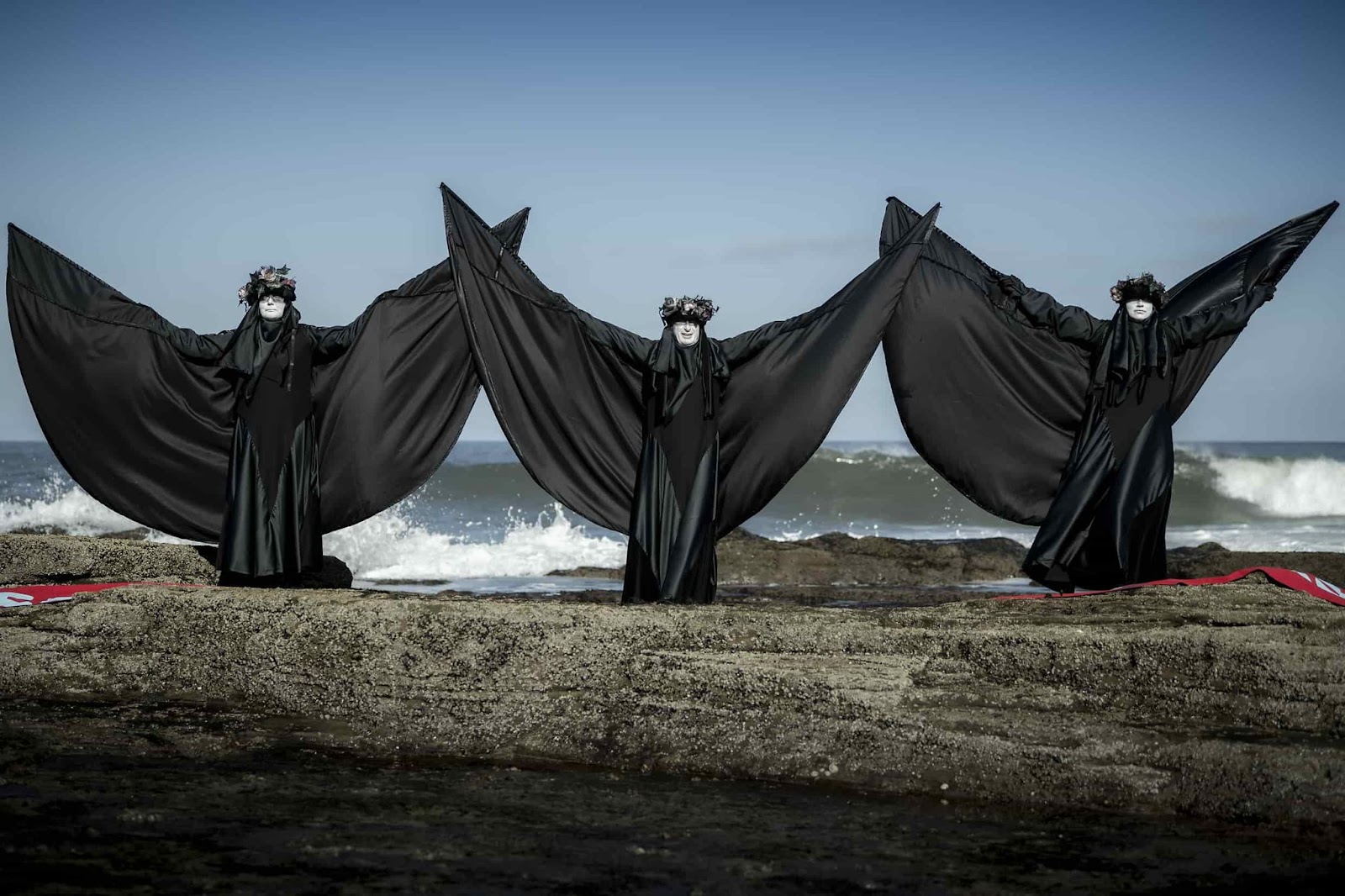
‘Oil slick’ rebels visit the Scottish coastline for the North Sea Fossil Free campaign.
Activists in six European countries bordering the North Sea have launched a new coordinated campaign to disrupt major fossil fuel infrastructure.
Rebels teamed up with members of Scientist Rebellion, Ende Gelände, and Becoming Species under the banner ‘North Sea Fossil Free’ to blockade oil refineries, LNG terminals, and fossil fuel harbours, and even perform a punk concert on a shipping container!
The governments of the six countries targeted by the campaign are allowing continuous new oil and gas extraction in the North Sea, and in the process abandoning the limits on emissions set by the Paris Agreement. Counted as a single country, these North Sea exploiters would be the 7th largest oil and gas producer in the world, just behind China.
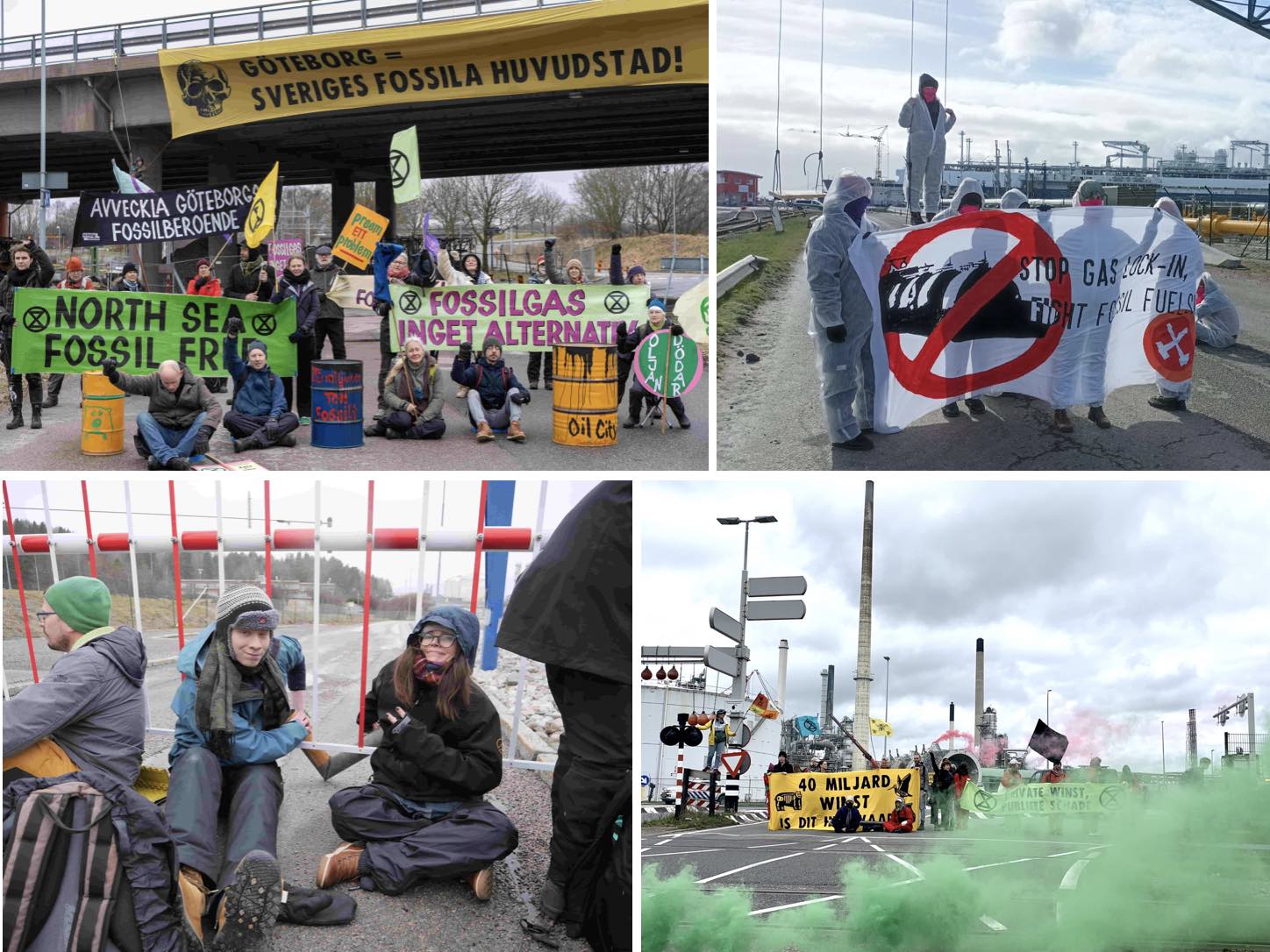
North Sea oil infrastructure blockades in (clockwise from top right) Sweden, Germany, Netherlands, Norway.
In Denmark, punk band Octopussy Riot intruded upon a section of Esbjerg Harbour owned by Total Energies. They climbed atop a shipping container to perform a live concert of protest songs against the oil giant, which is planning to re-open the country’s largest gas field in the North Sea and exploit it for 25 years.
German Ende Gelände activists blocked access to a floating LNG terminal in the industrial port of Brunsbüttel for six hours, demanding an immediate end to imports of liquified natural gas, which is more harmful to the climate than coal.
In the Netherlands, Scientist Rebellion joined rebels to block all the access roads, and even the train tracks, into Shell’s Pernis refinery, the largest oil refinery in Europe. As well as expanding production in the North Sea, Shell is allowing its old drilling platforms and pipes to just rust away, poisoning the sea with mercury, radioactive lead, and polonium.

XR Norway sailed into enemy territory to disrupt two oil tankers. Only one escaped.
Norwegian rebels braved a snowstorm to disrupt Rafnes Petroleum Refinery, sailing a boat into its security zone and forcing one oil tanker to dock, while a land-based group blocked the refinery’s main entrance. Meanwhile, in Sweden, rebels blocked the road to Gothenburg’s Oil Harbour for the entire day.
And finally, local rebel groups in Scotland dropped banners and staged an ‘oil slick’ performance at sites linked to Rosebank, the biggest undeveloped oil and gas field in the North Sea. Last year, Rosebank was green-lit for development by the UK government.
The ‘North Sea Fossil Free’ campaign was the work of a new activist network born during the Fossil Free London actions in October. After this inspiring debut, plans are already being drawn for a second wave of actions, and more rebel groups want to be involved next time.
Aussies Rebel For Life
12–16 MARCH | Melbourne, Australia
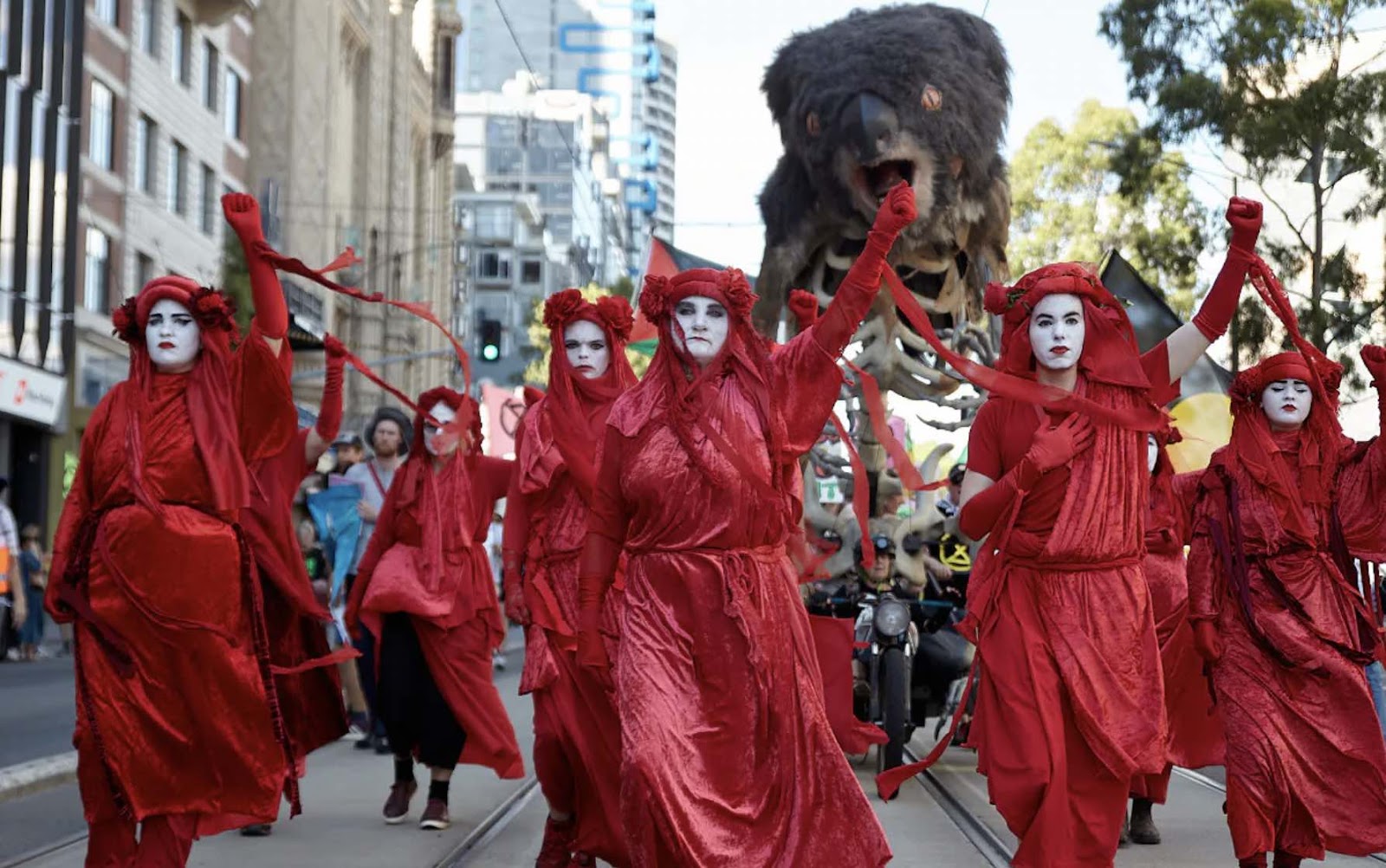
Red Rebels and a giant koala join a Melbourne slow-march. Photo: Danielle Judd
Australian rebels took to the streets of Melbourne’s central business district over five consecutive days to Rebel For Life and demand that their government declare a climate and ecological emergency. At least 27 activists were arrested by police, who were deployed in excessive numbers throughout the week of non-violent protest.
Inspired by Just Stop Oil in the UK, and bolstered by hundreds of rebels willing to risk arrest, XR Victoria set off each day for an early morning slow-march. After disrupting peak hour traffic, rebels took part in some dancing DISCObedience, formed mothers’ circles, and staged sit-ins.
The final day of rebellion saw rebels rally outside the doors of a think-tank, the Institute of Public Affairs – part of the aggressively anti-protest and Big Oil funded Atlas Network. This shadowy cabal of more than 500 think-tanks has been instrumental in discrediting climate science, stalling state-level climate action, and demonising climate activists around the world.
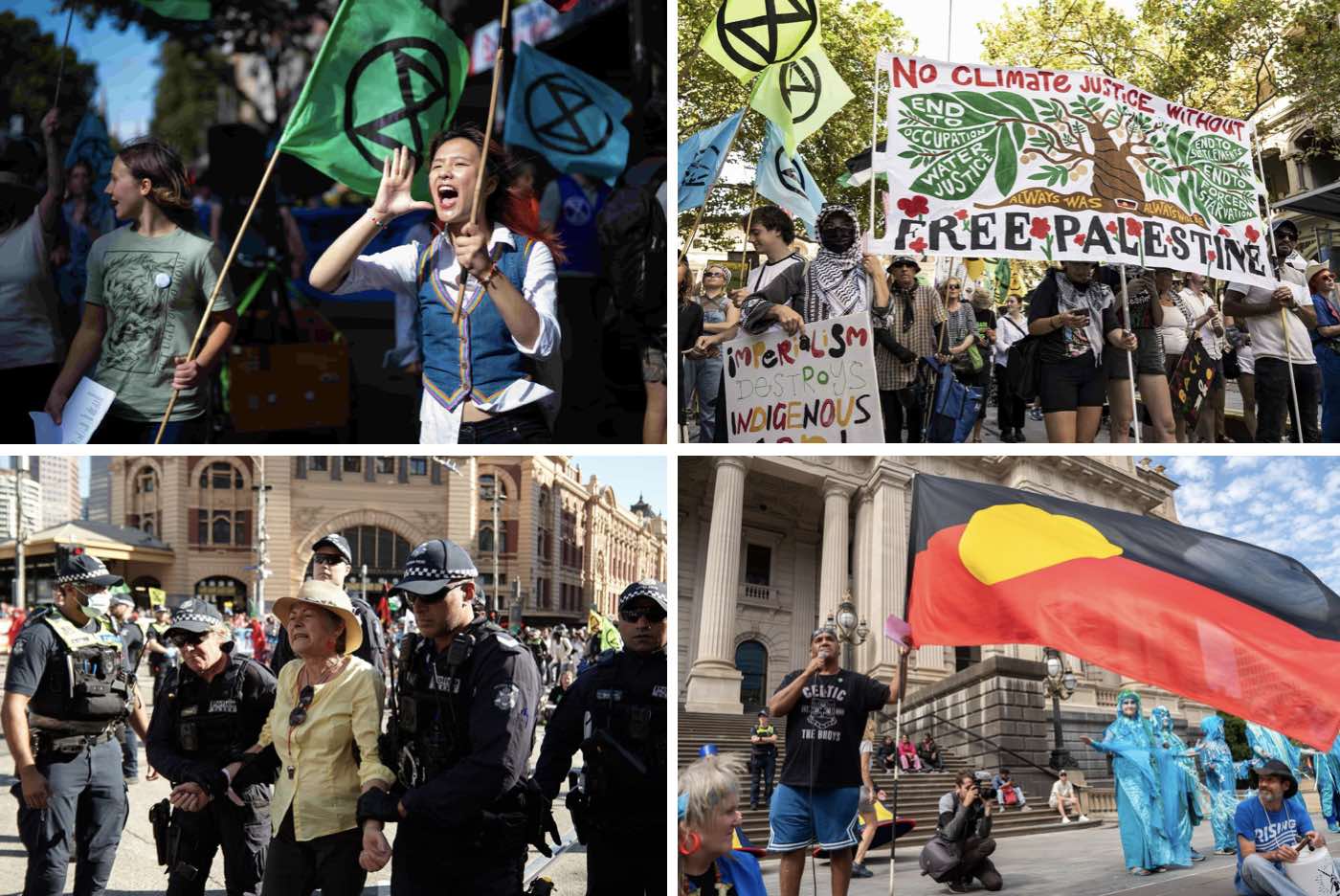
Rebel For Life photos: Julian Meehan, Matt Hrkac, Danielle Judd.
The rally was followed by a final slow-march to Flinders Street Station, Australia’s second-busiest train station, where hundreds of rebels who were willing to risk fines or possible arrest sat in the road. Police hauled them away, one by one.
Days before the Rebel For Life rebellion started, three rebels brought several lanes of traffic to a standstill on Melbourne’s busy West Gate Bridge, with two of them later sentenced to two months in prison. As in many parts of the world, police response and judicial sentencing have been growing harsher and more disproportionate across Australia. The Atlas Network has without a doubt played a part in that.
Find out more about XR Victoria’s Rebel For Life campaign.
Gas Flares, Mega Mines, and Tear Gas
4, 12–13, 27 MARCH | Quito, Yasuní & Palo Quemado, Ecuador

Rebels, anti-mining groups, and indigenous activists march through Quito to the national court to demand an end to illegal gas flares in Yasuní National Park.
Corporations and their government enablers want to keep the ecocidal reality of extractivism hidden, but rebels in Ecuador are exposing the truth.
The Ecuadorian government is callously pursuing metal and fossil fuel extraction without democratic consent, tear-gassing peaceful protestors in full view, and doing far worse to remote frontline communities. In the Cotopaxi region, where Canadian firm Atico Mining plans to extract gold and copper at the expense of a key water source, repression has been intensifying.
Ecuadorian law requires mining corporations to consult with impacted communities before starting operations. But when the Palo Quemado community in Cotopaxi attempted to exercise this right, police responded like Atico Mining henchmen, attacking more than 100 people and labelling them terrorists. One person was hospitalised and remains in critical condition.
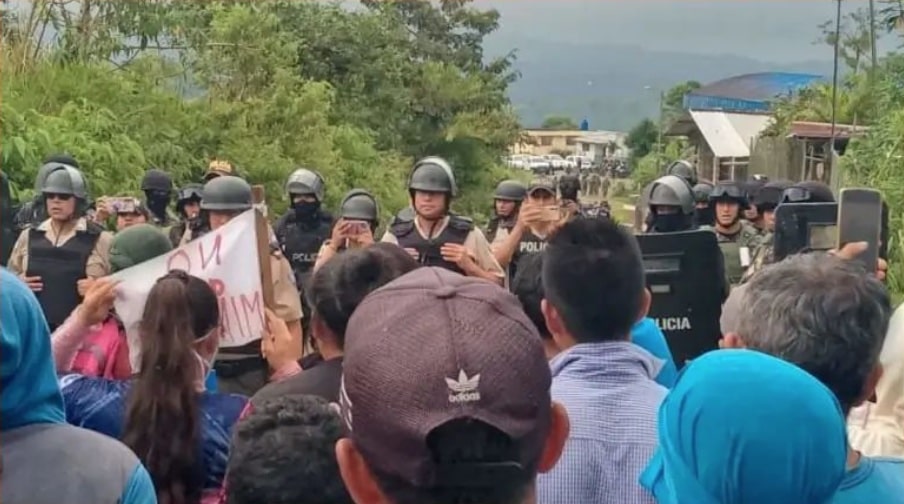
The Palo Quemado in the Cotopaxi region have been subject to police violence for resisting a Candanian-owned mega-mine on their land.
Refusing to let this violence stand, rebels and members of an anti-mining coalition joined with indigenous groups for solidarity actions in Quito, starting with a protest in front of the Canadian Embassy. Officials took note, as became apparent later that month.
Surrounded by press on a busy city street, police bombarded rebels and onlookers with tear gas during a peaceful sit-in at the Ministry of the Environment. “Something like this, in front of the media and the public, hasn’t happened in a long time in the city,” said a rebel from Quito. The protesters managed to stay calm, regrouped, and continued with their planned rally.

XR Ecuador and anti-mining allies protest outside the Canadian Embassy.
Illegal mining isn’t XR Ecuador’s only ongoing struggle. In a historic referendum in 2023, Ecuadorian citizens voted massively in favour of keeping over 726 million barrels of oil in the ground under the Amazonian Yasuní National Park. Celebrated as a climate victory around the world, the reality on the ground is that the battle to preserve this region, the most biodiverse in the world, is far from over.
Petroecuador, the state oil company, has actually ramped up extraction since the referendum, reaching a new peak production in 2023. In Yasuní alone, Petroecuador operates more than 400 gas flares, many beside the houses of indigenous people. The flares cause cancer, decimate biodiversity, and emit more than 100 million tons of greenhouse gases each year.
A successful lawsuit against the government to remove the flares was filed by Las Nueve Niñas, a group of young women from Yasuní. Yet three years later, the flares are still there, and the government is trying to wriggle free of the court’s order.
Rebels co-organized a march through Quito to demand compliance with the court, joined by Las Nueve Niñas and 300 more activists, and followed it with a sit-in at the national court. More actions are planned for May and June to pressure the government to stay true to its word, follow its own laws, and accept that Ecuador is not for sale.
Follow XR Ecuador on Instagram
Action Round Up
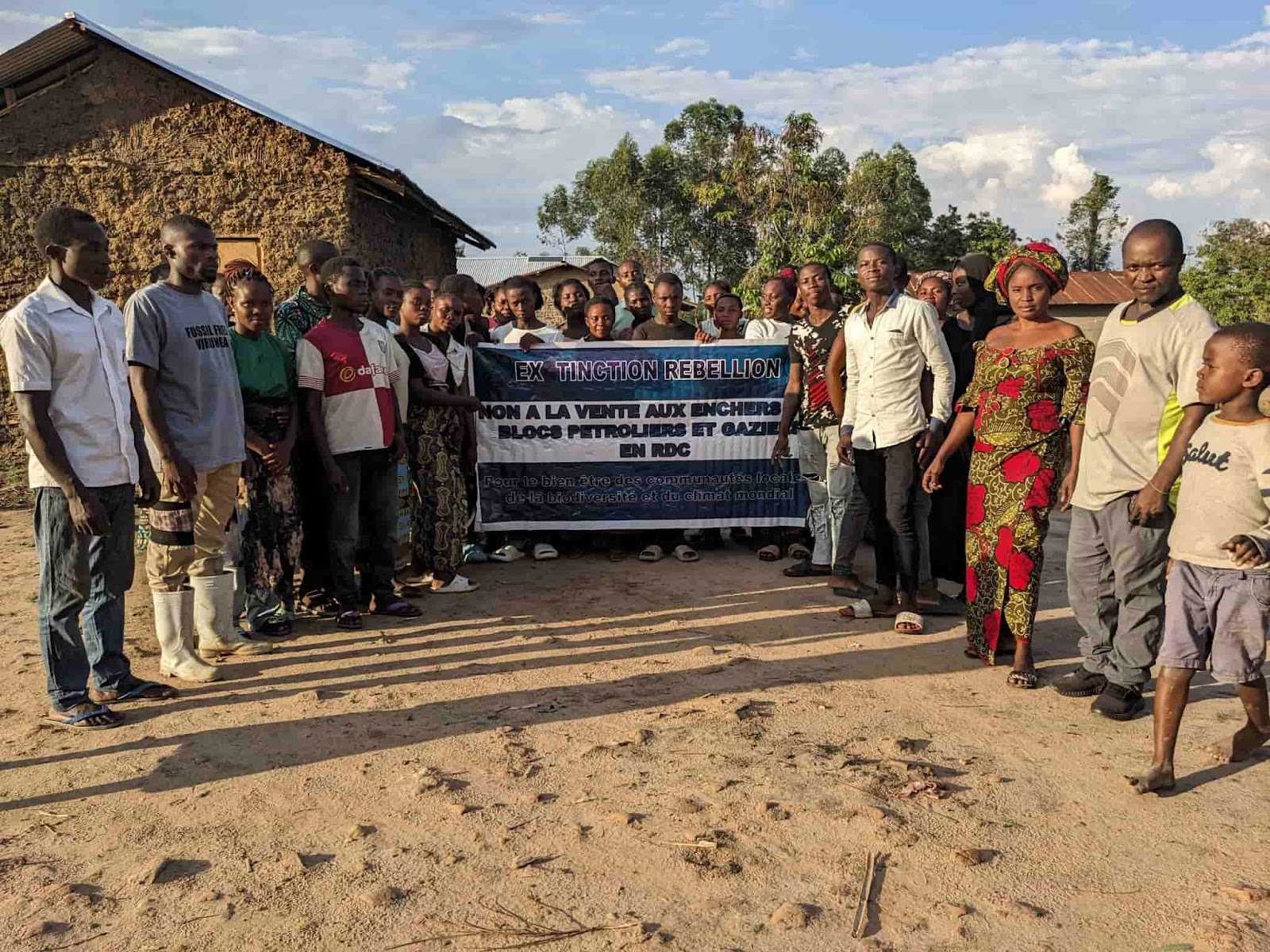
8 MARCH | Ishasha, DRC: XR Rutshuru visit communities bordering the Virunga National Park to explain how their government is auctioning licences to extract oil and gas from the region, jeopardising its biodiversity and 5 million inhabitants. Meanwhile, rebels in Goma are reporting that oil giant Perenco has withdrawn its bid for a series of oil blocks in DRC, a potentially major victory in the struggle to stop more ecocide in one of the most plundered nations on the planet.
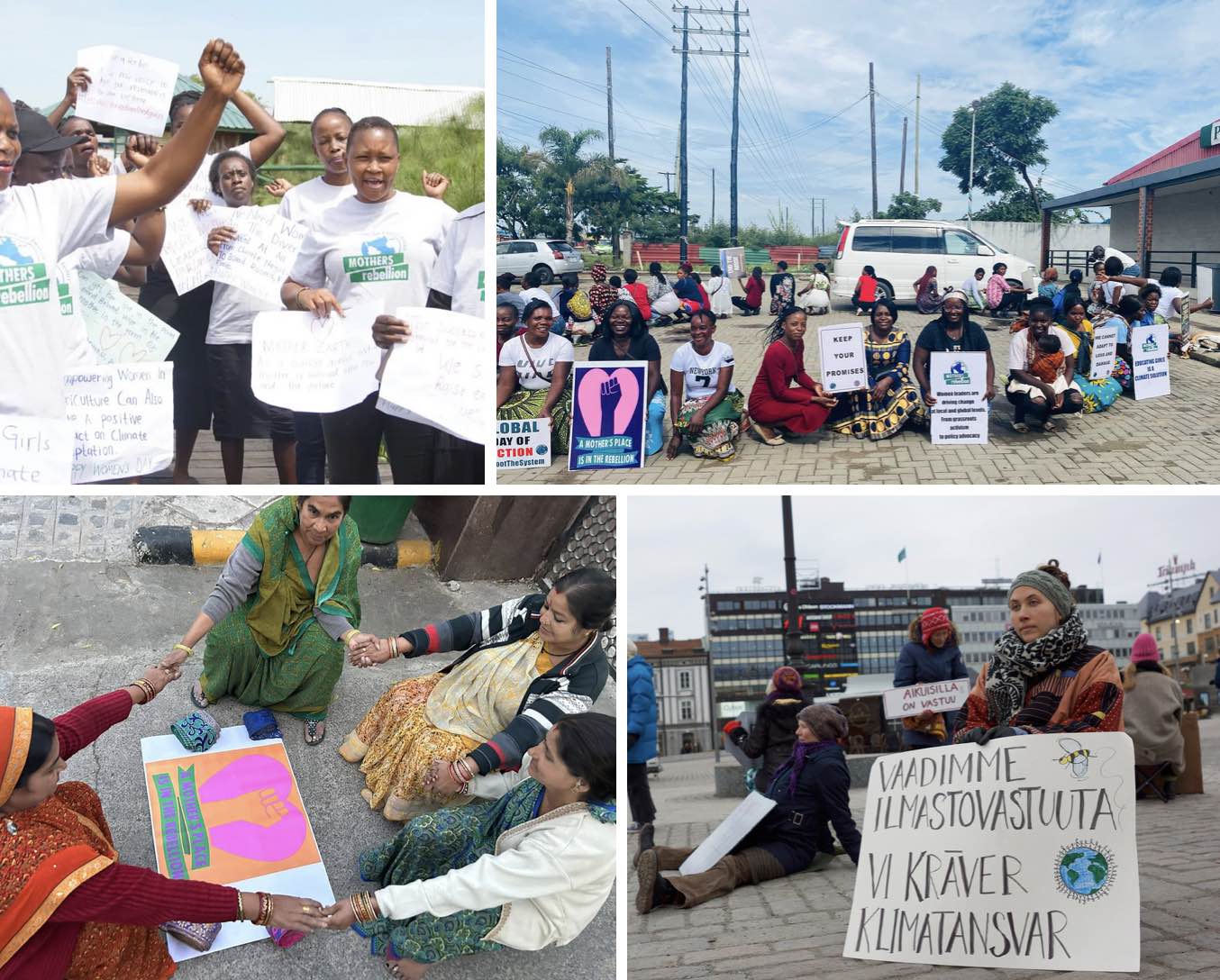
9 MAR | Global: Mothers* Rebellion hold a 4th global rebellion, with mothers and their allies forming protest circles in more than 90 cities across 30 countries. The fast-growing movement will mark its one-year anniversary by holding another global rebellion in May. Pictured (clockwise from top left) Kenya, Zambia, Finland and India.
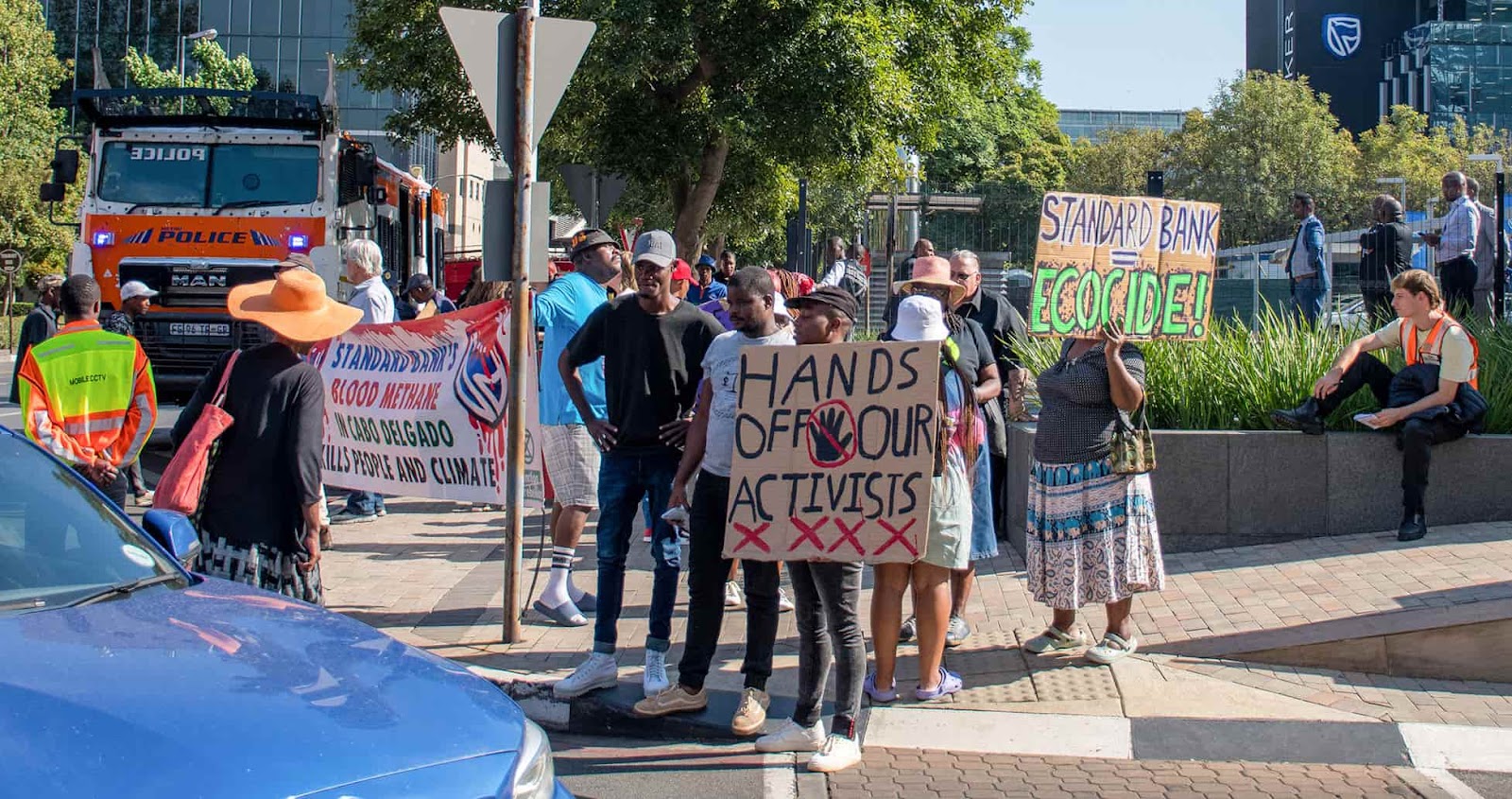
13 MAR | Johannesburg, South Africa: 60 XR Gauteng and StopEACOP activists continue their weekly pickets outside the HQ of Standard Bank, despite intimidation by police. A week earlier, police threatened to use pepper spray, threw away phones, and arrested a rebel whose charges were later dropped in court. Photo: Julia Evans

14 MAR | Murcia, Spain: The blue rebels of XR Murcia mark International Rivers Day by visiting the banks of the Segura River to reflect on how rivers all over the planet have been victims of pollution and drought, and need protecting.

14 MAR | New York, USA: Three rebels disrupt press night of the Broadway play “An Enemy of the People”. The play explores the lethal consequences of ignoring science for profit, and some critics mistook the disruption as part of the performance. The play’s star actor later said that he supported the action.
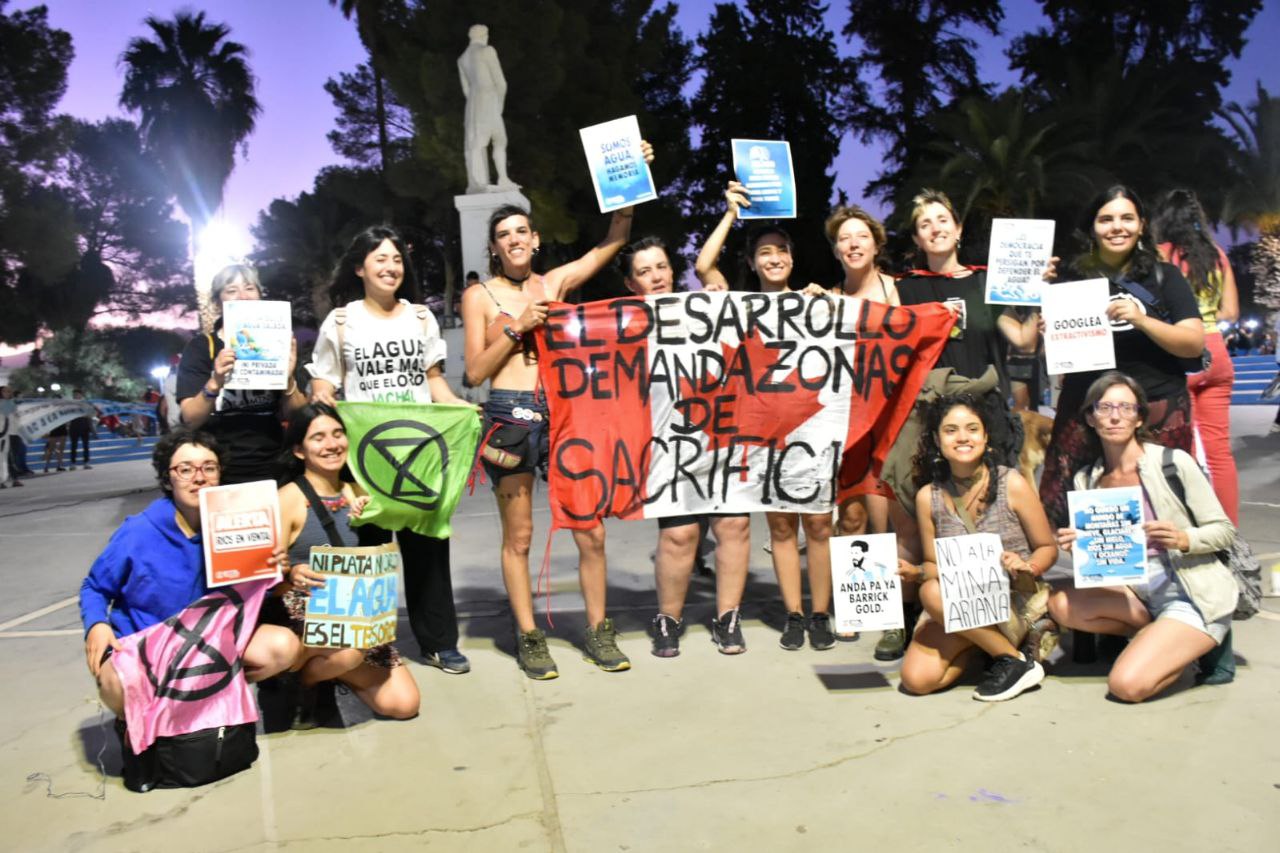
22–24 MAR | Jáchal, Argentina: Rebels join activists from across Argentina at the Puentes de Agua (Bridges of Water) festival in Jáchal. The town has been devastated by Canadian-owned gold and uranium mining, with multiple cyanide spills and the local river drying up completely. Local activists are now trying to stop the José María Project, which will extract copper, gold and silver using 30 times more water than previous mining projects. The government promised development in the region in exchange for extractivism, but the town has been left with only an empty hospital and no medical staff. Rebels rallied in solidarity with the locals, demanding that mining be banned in the region. Water is worth more than gold!

23 MAR | Donges, France: To celebrate Total Energies 100-year anniversary, XR Nantes launched their circus of climate disorder at France’s 2nd largest oil refinery. The circus featured many, many rebel clowns, all of whom condemned the oil giant’s continuing development of EACOP and 16 other climate bombs that will blow up the Paris Agreement. If it doesn’t agree to abandon fossil fuels at its AGM in May, French rebels will launch a large action to demand Total Energies’ liquidation.
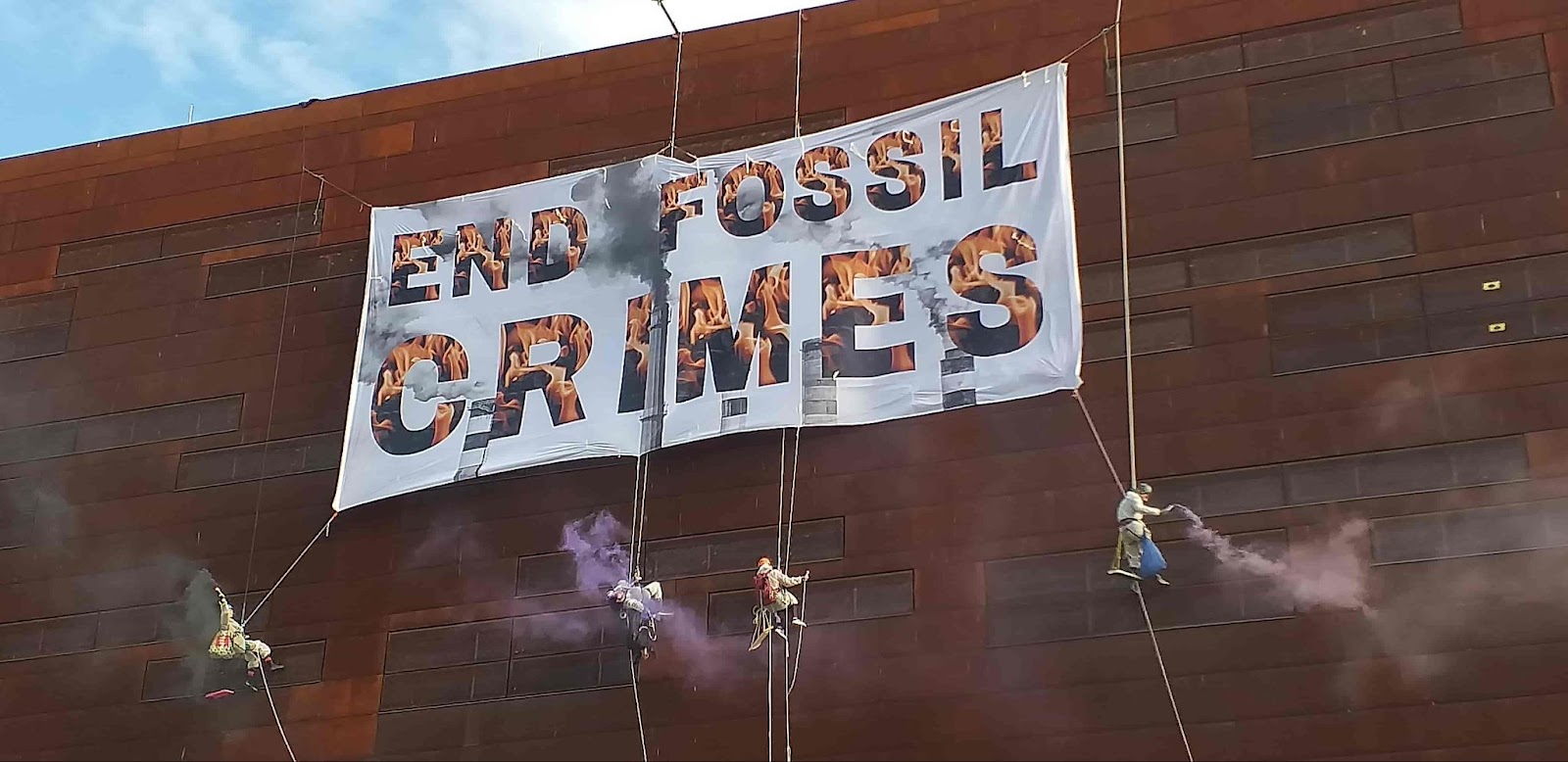
25 MAR | Vienna, Austria: Rebels and Debt4Climate activists abseil down Vienna’s Business School, where a major gas conference was planned but ultimately postponed, and unveil a huge ‘End Fossil Crimes’ banner. The activists jointly called for an end to fossil capitalism, and debt cancellation for the Global South.

26 MAR | London, UK: Ocean Rebellion target a Tesco supermarket in central London for selling John West tuna, who source their yellowfin tuna from Spanish fisheries that routinely trap and slaughter turtles, sharks & whales. Learn more about their disgusting and indiscriminate fishing practises.

28 MAR | Brussels, Belgium: Rebels and activists from TotalementDown blockade the entrance of Marsh McLennan, the insurance broker for Total Energies’ EACOP project. The Insure Our Future campaign continues!
Book of the Month
How Civil Wars Start: And How to Stop Them, by Barbara F. Walter

This book's title is precisely descriptive. Ms. Walter simply summarizes the vast modern scholarship on which factors make a country more likely to descend into civil war and/or genocide and why. Ms. Walter doesn't write much about climate change, and yet anyone who cares about climate change would do well to read her book.
War in general is bad for the planet and for people already at high risk from climate change. Worse, a country preoccupied by civil war will not engage in climate action. According to Ms. Walter, the United States is especially vulnerable to civil war now. That would be disastrous for everybody. So civil war needs to be on our collective radar.
But as Ms. Walter makes clear, it's possible to accidentally play into somebody else's plans for destabilisation. As activists, we need to understand how to avoid doing that. Reading this book might help.
Avoid Amazon. Support local bookshops. Buy books at Bookshop or Hive.
Must Reads
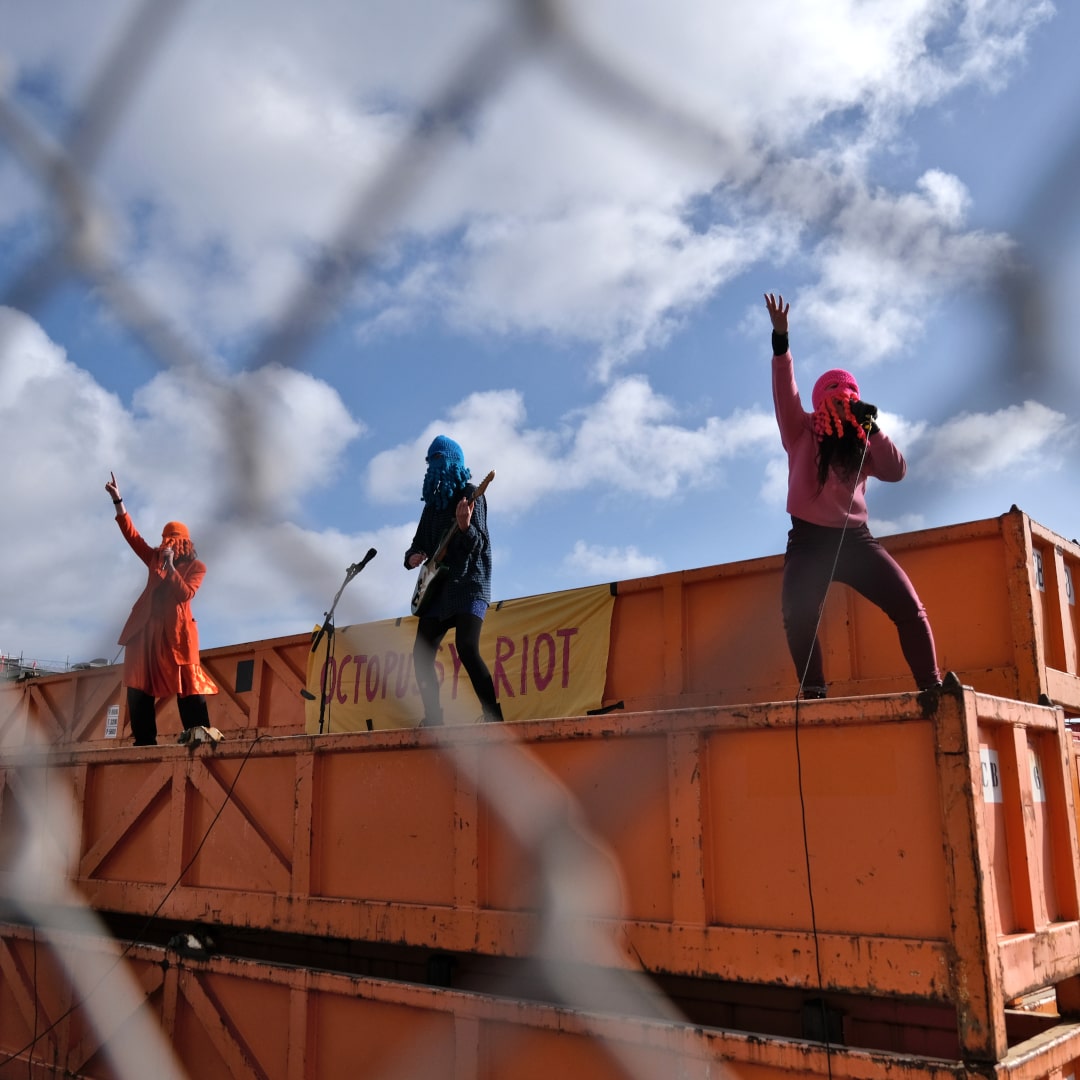
Octopussy Riot turn oil infrastructure into their stage for 'North Sea Fossil Free'.
Report: Troubled Waters - How North Sea Countries Fuel Climate Disaster
Oil Change International show how the oil and gas policies of North Sea countries (Denmark, Germany, Netherlands, Norway, UK) do not align with the Paris Agreement, how production will be ongoing in 2050, and how they would rank as the 7th largest oil and gas producer in the world if combined, just behind China.
Video: What Economists Don’t Know About Climate Science Can Kill Us
Scientist Rebellion interview Professor Steve Keen who talks in a frank and occasionally hilarious manner about how little economists understand the climate crisis, and how this ignorance has fuelled wildly inappropriate economic policies.
Article: Antarctic ice explains dip in CO2 levels of C.16th/17th
There's long been a debate about why there was a big decline in atmospheric CO2 in the 16th and 17th centuries. Thanks to a new ice core analysis by Dr Amy King, we now have the answer: colonialism. Yes, Europeans killed so many indigenous people in the Americas that forests regrew and the atmosphere cooled. Chilling.
Article: Civil Disobedience Increases Climate Change Concern in Germany
A new academic paper investigates whether concerns about climate change increase following demonstrative protests and confrontational acts of civil disobedience in Germany. The resounding answer is, yes it does. Keep doing what you’re doing, rebels.
Announcements
XR Global Support: Donate Now!

XR Global Support has launched a new crowdfunding campaign for 2024.
As the name suggests, XR Global Support supports rebel groups around the world, prioritising those in the Global South which are most affected by the climate crisis.
Your donations will be turned into grants for rebel actions, global media channels to amplify them, and secure comms for rebels to organise safely wherever they live.
So please give what you can, and thank you for your support.
Everything Is Fine: Climate Protest Film
Coming Soon

Activist turned filmmaker, Rich Felgate, award-winning director of FINITE, has spent the last two years filming people on the frontlines of climate protests in the UK for a forthcoming feature documentary EVERYTHING IS FINE.
The film tells the inside story of how far activists in Just Stop Oil will go to stop new oil and gas, and how far the government will go to stop them.
Filming is almost complete, but the filmmakers need to crowdfund £70,000 to finish the edit and share this urgent film with the world. Watch the trailer and donate here.
Thank you

1995 | Wyoming, USA: Nearly 30 years ago, 14 wolves were reintroduced into Yellowstone National Park, and the results have been extraordinary. The wolves have boosted biodiversity and even strengthened the course of rivers.
Thank you for reading, rebel. If you have any questions or feedback, we want to hear from you. Get in touch at xr-newsletter@protonmail.com.
This newsletter is brought to you by XR Global Support, a worldwide network of rebels who help our movement grow. We need money for this crucial work.